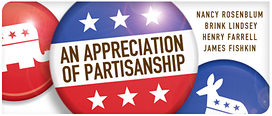I think this dialogue has helped bridge some areas of discussion that rarely intersect — deliberative democracy and partisanship. Actually, the discussion makes clear that each needs the other. Consider two possibilities: deliberation without partisanship and partisanship without deliberation.
In a world of many partisans, deliberation without partisanship would be unrepresentative because it would leave out the many partisans who are a key part of the electorate and the public dialogue. Such a neutered deliberation would also be deprived of the passions which Nancy points out are a key animating factor in political dialogue. It would be deprived of well articulated perspectives that enrich the debate. Deliberations with random samples of the mass public, the form I advocate, aspire to be both representative and balanced. Without partisanship included they are neither. Much of the material for balance would be lost and key portions of the electorate would be left out.
But partisanship without deliberation undermines the possibility of collective will formation in the public interest. If people are not deliberating but singlemindedly pursuing party advantage, then democratic competition is reduced to mobilization and to any sort of persuasion that works, no matter how misleading or manipulative. The desire to win in the hands of modern political consultants leaves little room for deliberation and leaves us all facing a fun house mirror of half truths.
So we need both, both in party institutions (more deliberative candidate selection and party conventions) and in policy making. Hence an agenda of institutional experimentation needs to be combined with modern social science. When Madison idealized deliberative institutions, he lacked a political science (he had to conceive of one that would serve) and he made a crucial mistake in leaving out political parties. He later helped found one himself but the political science of deliberation fell by the wayside. It needs reviving in a modern world where political parties have all the virtues Nancy envisages, but where some of their vices can be avoided.

